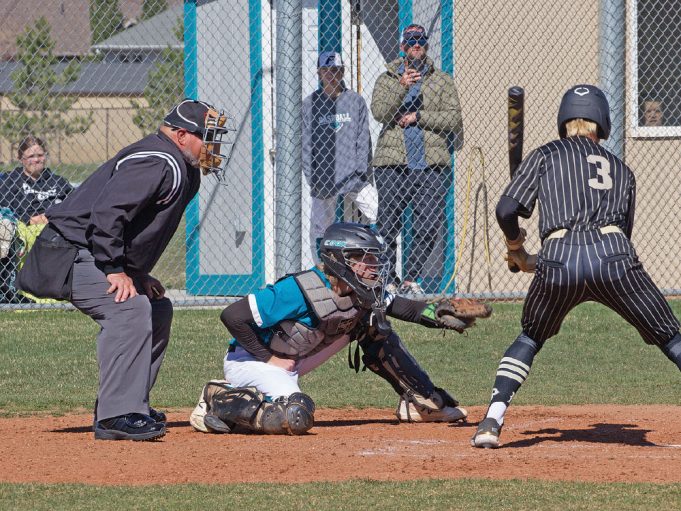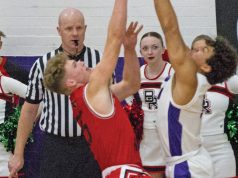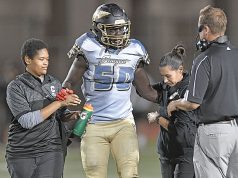Calling Them the Same Is the Elusive Goal
Be consistent.
If you’ve officiated for any length of time, you’ve likely heard that comment on numerous occasions.
It means different things to different people. If the comment comes from a coach it means, “I don’t want them called the same way for both teams; I want them called my way all the time.”
If an assigner, coordinator or assessor talks about consistency, it’s often part of a discussion about a point of emphasis or a rule interpretation. Consistency also matters when it comes to issues like working well with your partner or crew, adhering to policies established by your association or conference, or even interacting with players and coaches.
Consistency is the foundation of an official’s credibility. But because officials see the game differently from coaches and spectators, our definition of consistency differs as well. Some would argue true consistency means calling the same action the same way regardless of where or when it occurs or any other circumstances.
Yet consistency is something that’s virtually impossible to measure. The coach who hollers, “We’ve got eight fouls and they’ve only got two,” conveniently overlooks the fact his opponent is playing a passive zone defense while his own team is playing a pressing man-to-man. If several penalty flags fly in a short stretch of plays, a football coach will whine, “C’mon! Let ’em play!” But if a hand is laid on his quarterback a nanosecond after he’s released a pass, the complaint will shift to, “Where’s the flag?”
In short, statistics pertaining to fouls called, flags thrown, yardage penalized, etc., whatever the sport, may be useful to an assessor or assigner, but are not indicative of an official or a crew’s level of consistency. Skilled teams will require less officiating than poor ones and officials do not always draw the cream of the crop. Experienced officials also know abandoning a certain amount of consistency in blowout games — passing on minor, non-safety-related violations committed by the trailing team, for instance — is not only acceptable but appreciated.
Competence vs. consistency
Consistency by itself does not equal competence. To be effective, an official must be capable of something called competent consistency. An umpire who calls the pitch at the ankles a strike all day, or an assistant referee who continually misapplies the Law on offside, may be consistent, by dictionary definition. But in instances like those, consistency does not equal competence.
Consistency, within a single game, or game-to-game, is related to the ability to concentrate on the task at hand. That can be difficult for officials working rec league, high school or even small-college games, who more often than not must deal with job and/or family responsibilities on game day before turning their attention to officiating.
Officials working at amateur levels often find themselves jumping from one level to another, perhaps handling a contest involving 13-year-olds one day and high school athletes the next.
The official may have to adapt to a different level of play, variations in the rules or wide variations in ability among players in the same game. All those factors can make achieving consistency more difficult.
As vital as it is for officials to maintain a consistent set of standards from one call to the next, it’s just as important to establish consistency among members of a crew, whether that crew has been together for 10 games or 10 years.
If one official is quick with the whistle and his or her partner or partners have a “let them play” approach, players and coaches can become frustrated. Nothing will drive a coach to distraction quicker than a situation where one official is calling things significantly different from another.
The best way to prevent that type of situation from dragging down your game is to conduct a thorough pregame conference.
It’s important for any official on any level to maintain focus on the game. The atmosphere in which the contest is played can make that task more daunting however, particularly if one or both coaches is barking at you.
The ability to handle complaints from coaches and others involved in the game while still being able to maintain a high level of consistency is what differentiates extraordinary officials from merely capable ones. When the temperature of a game starts to rise, it’s important for officials to retain confidence in their own ability.
It would be difficult if not impossible to teach consistency, but it can be learned. As officials gain experience, they learn what calls (and no-calls) are appropriate to the level they’re working. Reviewing games via video is one way officials can self-evaluate the consistency of their work.
As you watch, ask yourself, “What are you looking for? What angle are you trying to achieve? Are you in the right position?” While few plays or situations are exactly the same, the official can get a general idea of his or her consistency in movement, distance from plays and angles.
The question of whether consistency is a natural attribute or a skill acquired over time may never be completely answered. But maintaining your consistency will improve your game at whatever level you work.
Adapted from a feature that appeared in the 6/10 issue of Referee. *
What's Your Call? Leave a Comment:
Note: This article is archival in nature. Rules, interpretations, mechanics, philosophies and other information may or may not be correct for the current year.
This article is the copyright of ©Referee Enterprises, Inc., and may not be republished in whole or in part online, in print or in any capacity without expressed written permission from Referee. The article is made available for educational use by individuals.

















